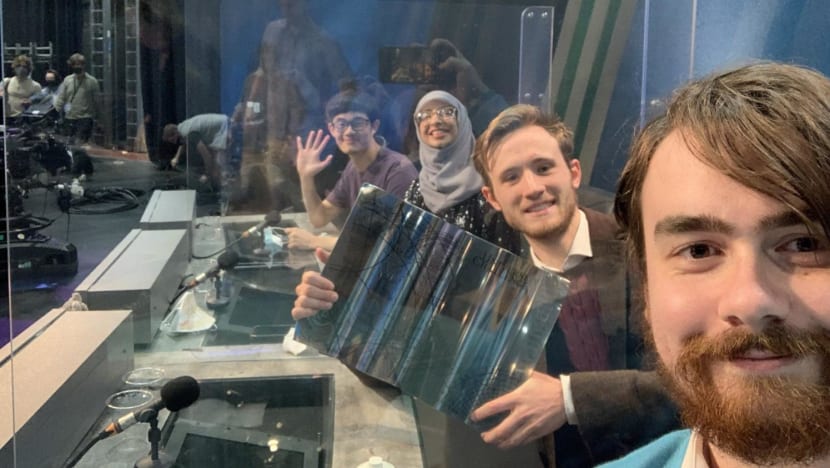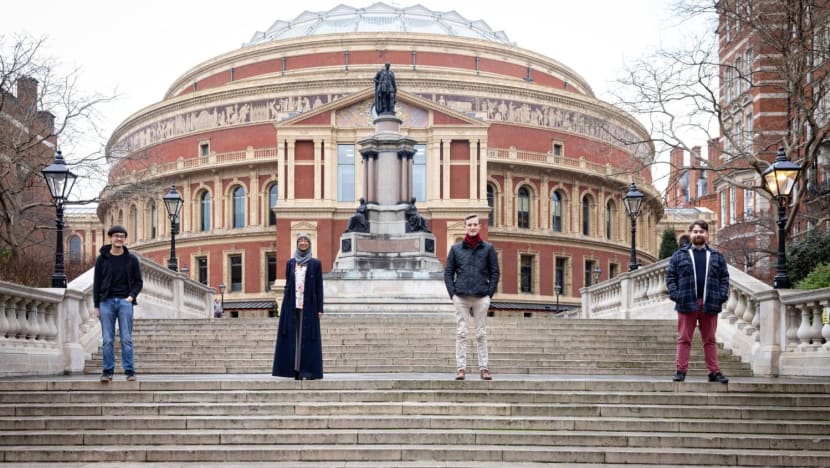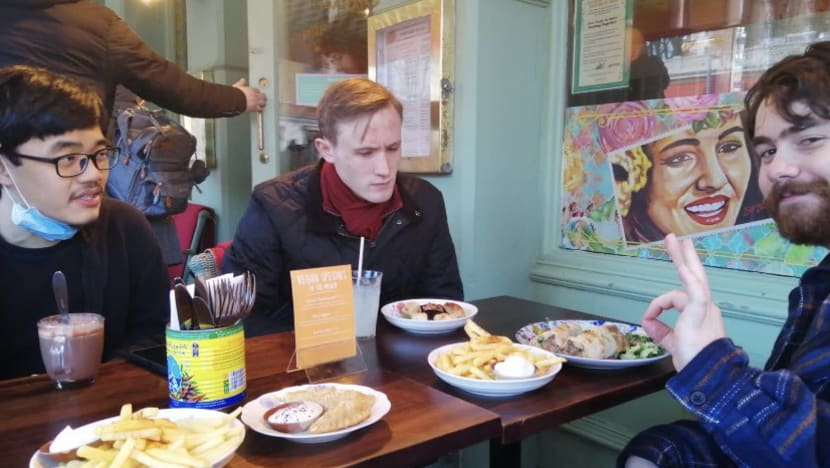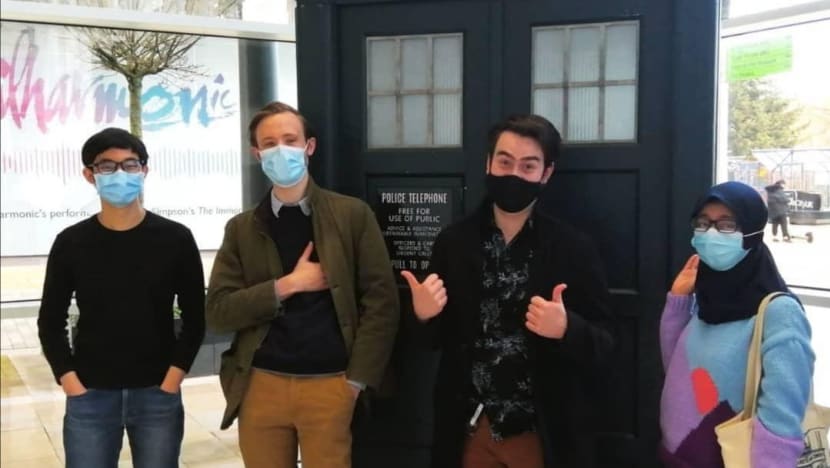Online virality, friendship and embracing niche interests: Max Zeng and Team Imperial College on life after University Challenge
Singaporean student Max Zeng and his team have got their fair share of media attention for their performance on University Challenge. But beyond their onscreen personas, who are they?

The Imperial College team at University Challenge, with its team captain Michael Mays holding their champion's trophy. (Photo: Gilbert Jackson)
SINGAPORE: Maximilian Zeng never expected his team from Imperial College London to make it past the first round of University Challenge.
But on Apr 4, he and his teammates Fatima Sheriff, Michael Mays and Gilbert Jackson won the latest season of the long-running, prestigious British TV quiz show, which pits teams of students from universities against one another in a test of obscure general knowledge.
“I didn’t realise that we’d won until like five seconds after the gong went. There is an official picture taken where … I’m just looking at the scores, not knowing what’s going on. So it took me awhile to internalise it,” he told CNA after the finals.
“At every round, I didn’t really expect to win. I didn’t even expect to win in the first round. … So by the time we got to the finals, it’s like we’d gotten far enough, I don’t really care what the outcome is.”
Yet it was a season marked by widespread social media praise for Max’s performance.
Max, also known as Zeng by viewers, was recognised for his ability to pinpoint any location on a map. The 22-year-old biochemistry undergraduate from Singapore also demonstrated equal prowess and passion for a range of other topics from history to mathematics.
And his teammates Fatima, Michael and Gilbert weren’t immune to the resulting social media furore.
The team found themselves microcelebrities even before they were crowned champions.
WHAT ONLINE COMMENTERS GOT WRONG
With each episode only lasting 30 minutes, viewers only got to see snippets of the team's personalities. But this didn’t stop online commenters from dishing out “pretty negative comments”, shared Gilbert over a Zoom call with CNA.
The 21-year-old, who’s pursuing an integrated master’s degree in chemistry, noted that many of such online comments were directed at him and team captain Michael, and Michael's perceived habit of usually turning away from Max and Fatima to discuss possible answers to a question.
“I found it hilarious because those comments were blatantly wrong,” Gilbert said.
“Because Michael always turned to me when you saw it on camera, I feel like people didn’t realise that we all had assigned specialisms. And if there’s a question about science or music, of course Michael would turn to me; with a lot of bonus questions, you get a lot of intricate science (questions).”
Gilbert pointed out that if Michael indeed always turned to him and neglected their teammates like commenters said, then they wouldn’t have got as many high scores as they did.
“We knew it was always a team effort and we did well as a team. And I think people never really saw that, until we had to get out there and tell people that we're actually really good friends, and we do value each other very, very much,” he said.
Several commenters also suggested out that Gilbert didn’t pull his weight, added Fatima in a separate conversation with CNA.
“Me and Michael get very angry when people say Gilbert is some kind of deadweight. That gets on my nerves; that really annoys me. People will just be blatantly rude and say stuff like that. Why would you think it’s okay to insult a teammate to my face?” said the 24-year-old master’s student in science communication.
“Because we know how brilliant Gilbert is, and he has such excellent moments. But unfortunately because it’s only six episodes of a very chaotic (topic) distribution, the questions don’t always go his way.”
Acknowledging the people who overlooked his contributions, Gilbert said that the team is “pretty evenly matched”, and everyone’s contributions were “just as valid” to help them win the competition.
“(These commenters) don't really know who you are as a person. They just know what you do on the show. And a lot of people just tend to be reading into things that just don't exist, or thinking that they’re experts in a lot of things, which is really weird. But I guess that's just a weird sort of dark space of Twitter, social media that you get,” he said.
On the other hand, Fatima and Michael were on the receiving end of comments that speculated the latter was being racist and misogynistic towards her – because it appeared he didn’t turn towards her as much as he consulted Gilbert sitting on his left.
“It wasn’t fun (to read the comments) after the first night. … Any sort of claims of misogyny or racism are slightly wild. I think you could reasonably claim that I was being rude, but not that it was based on race or gender,” said Michael, 25, a doctor of philosophy student in computational fluid dynamics.
Fatima added that she would tell someone off if they were being sexist or racist, so Michael would have noticed. But she’s never had to do that.
“People assume that I’m some sort of victim. And I’m like, no. People don’t realise that they’re also being racist and sexist by assuming that I didn’t have my own agency and that I wouldn’t speak up if there’s something I wasn’t fine with,” she said.
Fatima also noticed that people seemed to assume episodes were “more live than they (were)” based on their comments.
“They’ll assume that we’ve heard the comments in between episodes, even though we filmed everything in October last year. They’ll be like, ‘Oh, Sheriff has found her voice.’ And I’m like, ‘Never lost it.’”
After the four of them addressed such comments via a live stream on YouTube channel All Things Quiz halfway through the season of University Challenge, subsequent online reactions got “much better” when people realised they were genuinely good friends, Gilbert said.

FRIENDSHIP BEFORE FAME
Even though their camaraderie made for good TV and teamwork, the four of them hit it off even before online virality brought them closer.
Gilbert described his teammates, including Max, as “quite outgoing people” and conversationalists.
“Max and I like to have lots of conversations about things like architecture that can go on for ages and ages. Personality wise, I think we were all quite outgoing people, even if Max likes to think that he's not as outgoing. But generally, I think Max is certainly very conversational and very friendly,” he said.
On the other hand, Max described himself as a generally “very, very anxious and pessimistic person before I get confirmation of something”, including waiting for job or university offers, or in this case, winning a competition.
“Applying for a job, I will convince myself that no employer wants me: ‘Why should I apply for this job? Why should I apply for this university? I’m just wasting my academic references.’ Yeah, I’m super pessimistic … I’ll always be telling myself this is not going to happen,” he said, laughing.
“Then it happens and I’m happy for awhile, and then I go back to thinking about the next step.”
And in terms of next steps, job applications weigh heavily on Max’s mind, as he’s graduating from his bachelor’s degree soon. He hopes to pursue a master’s in engineering, and said work experience would be “very advantageous” in that field.
“Now I'm just super anxious, because I’m from Hwa Chong (Institution). I'm from a good university. I'm not going to sugarcoat it. So basically, you're surrounded by people who are high achievers,” he said.
“I feel two things at one time. So one thing is, I can't get into what I want that I'm applying to. And the other thing is, I keep thinking that if I'm applying to other things, I’m underselling myself,” he added.
“They’re very contradictory thoughts. One moment you’re like, ‘I can’t even get in’; another moment, it’s like, I shouldn’t undersell myself. And eventually it becomes destructive, and I don't apply to anything. I perceive all my acquaintances from high school to be a lot more successful than I am now, which is what leads to that mindset.”
Social interaction is the worst part about applying for internships, explained Max.
“Most of all, the part that really scares me (about applying to internships) is the fact that you have to make good connections in three months, and then after three months, you're gonna go and you're not sure you're gonna meet any of these people again. So it's really, really awkward to be in there as an intern,” he said.
“I'm always okay with making relationships if I know they're gonna last. But the scary thing about … working a short term job is you're not sure how much to put into a relationship. Yes, it's scary.”

Despite his challenges with social interaction, Max felt comfortable with his team. To him, this was “good enough”.
“I am a bit of an outlier in my team, because they like to talk about operas and art and music. And obviously, as you can see on the show, when they’re all discussing (those topics), I’m just shutting up, because I don’t know anything about that,” he said.
“We do have different interests. I do talk to them about architecture, which is a field I know a bit in. But I'm comfortable around them, and that’s what matters.”
Similarly, Fatima felt comfortable “quite immediately” around the rest, with the team complementing each other’s strengths.
“We managed to divide up learning Nobel Prizes and learning Shakespeare quite evenly. And so we weren't really stepping on each other's toes. I feel like the only thing that a lot of us learned was about art. Otherwise, mostly we had our niche and it was nice,” she said.
“So for example, I was saying I liked Shakespeare, but I only liked comedies. Then Gilbert said he liked the history, and Michael said he can do the tragedies. It spread out quite neatly.”
In an earlier interview with CNA, Max admitted that he has a “reputation” on his team for complaining about the questions he answers. Speaking to CNA on the same call after the finals, Michael and Fatima laughed as they recalled their teammate’s behaviour.
“I remember there was a set (of questions that went to the other team) - I think it was in the semifinal - about scripts and languages. And I was like this is the perfect set for Max. I just turned to him, and he was unhappy. So unhappy. … (That said,) he’s always complaining that the questions he gets, he doesn't like,” said Michael.
“He can answer them without blinking. But he’s like, 'this isn’t fun though',” added Fatima.
Related:
ON BEING “WEIRD” AND HAVING NICHE INTERESTS
But years before Max wowed audiences with seemingly effortless answers to obscure geography-related questions and found friends in Fatima, Michael and Gilbert, he was just a boy who would sit at the side of the playground in kindergarten with his teacher while everyone else played.
“I was never a super social person. But that said, I did have close friends in primary school. Because that time, when you're not neurotypical, it doesn't show up because everyone's a kid,” said Max.
In his first year in secondary school, things changed. It was “absolutely horrific” because he was “weird” at that time, he recalled.
Moving onto junior college, classmates would talk about him behind his back, and visibly express their dislike whenever they ended up with him for a group project. He was then bullied during national service.
University, however, was a turning point. For one, the media coverage of Max’s performance on University Challenge so far has been a “positive experience”, he said.
“Secondly, I feel like university is the first time that I've actually learnt social skills and put them into practice. … I have become a lot more socially adept. I won’t say (I’m) socially successful; I have just learnt how to act around people. When in private, I'm still myself,” he added.
In fact, Max would advise kids like him to “keep a low profile”.
“Honestly, it’s very beneficial. People will be more willing to write off your slip ups if you are shy rather than if you’re boisterous like me. I was very, very, very boisterous during my high school and JC (junior college) years. I was super outspoken,” he said.
“Now I've learnt to really keep a low profile, not speak up when I’m not needed, keep quiet when people are talking about sensitive topics, even if I disagree with them – all stuff that comes instinctually to normal people but me.”

While the rest of the team weren’t bullied, they understand how having niche interests can feel isolating, even if a possible consequence is getting to win a prestigious quiz show.
“I think there's like a mixed relationship (with people who participate in University Challenge), in the sense that … I think the general public think (people on University Challenge) are a bit weirdo. But they’re also, like, impressed. They have a sort of respect for us,” said Michael.
“So that's why (University Challenge) is this sort of odd cultural institution, in that everyone watches you even if they're no good (at the questions).”
Gilbert added that he knows how it feels to appreciate things that not many people know about, but finding online forums where people discuss such stuff can be a good way to pursue these interests.
“It's often like you're talking to a bit of an empty room, a bit of a blank space. But I was always grateful that some of the people I met were very willing to learn about things like that. … They just let me talk about whatever it is, even if they didn't understand it,” he said.
“I was lucky to have parents who are also interested in that sort of stuff. So the home environment was often a really comfortable and good place for me to pursue my interests. School and the outside world was never easy; I just had to be a bit more of a conformist. But when I got home, I could do whatever the hell I wanted.”
And even though having niche interests can be difficult when you’re young, “you shouldn't let other people stop you from being able to enjoy your hobbies”, said Fatima.
“It’s obviously easy for us to say that now, but I’ve always found it very difficult to do things I don’t enjoy. So I don’t think I could pretend to like things I don't. I don't really know any other way to function.”
It just takes time to find your place, Gilbert noted.
“I came to university and then I found all these like-minded people on the University Challenge team. And now we do so much together, we do so many trips, we do so many extracurricular things, it's insane. And that's what it all built up to,” he said.
“It’s annoying but it's something you do just have to wait for – it will come and it will arrive, but bide your time.”


















